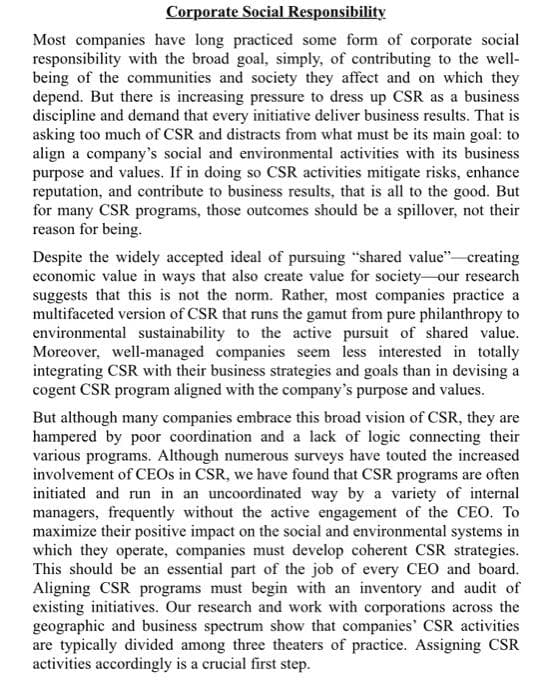Problem-02- Why well-managed companies seem less interested in totally integrating Corporate Social Responsibility with their business strategies and goals, explain with the support of suitable examples?
Problem-02- Why well-managed companies seem less interested in totally integrating Corporate Social Responsibility with their business strategies and goals, explain with the support of suitable examples?
Practical Management Science
6th Edition
ISBN:9781337406659
Author:WINSTON, Wayne L.
Publisher:WINSTON, Wayne L.
Chapter2: Introduction To Spreadsheet Modeling
Section: Chapter Questions
Problem 20P: Julie James is opening a lemonade stand. She believes the fixed cost per week of running the stand...
Related questions
Question
Question attached

Transcribed Image Text:Problem-02- Why well-managed companies seem less interested in totally
integrating Corporate Social Responsibility with their business strategies
and goals, explain with the support of suitable examples?

Transcribed Image Text:Corporate Social Responsibility
Most companies have long practiced some form of corporate social
responsibility with the broad goal, simply, of contributing to the well-
being of the communities and society they affect and on which they
depend. But there is increasing pressure to dress up CSR as a business
discipline and demand that every initiative deliver business results. That is
asking too much of CSR and distracts from what must be its main goal: to
align a company's social and environmental activities with its business
purpose and values. If in doing so CSR activities mitigate risks, enhance
reputation, and contribute to business results, that is all to the good. But
for many CSR programs, those outcomes should be a spillover, not their
reason for being.
Despite the widely accepted ideal of pursuing "shared value" creating
economic value in ways that also create value for society-our research
suggests that this is not the norm. Rather, most companies practice a
multifaceted version of CSR that runs the gamut from pure philanthropy to
environmental sustainability to the active pursuit of shared value.
Moreover, well-managed companies seem less interested in totally
integrating CSR with their business strategies and goals than in devising a
cogent CSR program aligned with the company's purpose and values.
But although many companies embrace this broad vision of CSR, they are
hampered by poor coordination and a lack of logic connecting their
various programs. Although numerous surveys have touted the increased
involvement of CEOS in CSR, we have found that CSR programs are often
initiated and run in an uncoordinated way by a variety of internal
managers, frequently without the active engagement of the CEO. To
maximize their positive impact on the social and environmental systems in
which they operate, companies must develop coherent CSR strategies.
This should be an essential part of the job of every CEO and board.
Aligning CSR programs must begin with an inventory and audit of
existing initiatives. Our research and work with corporations across the
geographic and business spectrum show that companies' CSR activities
are typically divided among three theaters of practice. Assigning CSR
activities accordingly is a crucial first step.
Expert Solution
This question has been solved!
Explore an expertly crafted, step-by-step solution for a thorough understanding of key concepts.
This is a popular solution!
Trending now
This is a popular solution!
Step by step
Solved in 2 steps

Recommended textbooks for you

Practical Management Science
Operations Management
ISBN:
9781337406659
Author:
WINSTON, Wayne L.
Publisher:
Cengage,

Operations Management
Operations Management
ISBN:
9781259667473
Author:
William J Stevenson
Publisher:
McGraw-Hill Education

Operations and Supply Chain Management (Mcgraw-hi…
Operations Management
ISBN:
9781259666100
Author:
F. Robert Jacobs, Richard B Chase
Publisher:
McGraw-Hill Education

Practical Management Science
Operations Management
ISBN:
9781337406659
Author:
WINSTON, Wayne L.
Publisher:
Cengage,

Operations Management
Operations Management
ISBN:
9781259667473
Author:
William J Stevenson
Publisher:
McGraw-Hill Education

Operations and Supply Chain Management (Mcgraw-hi…
Operations Management
ISBN:
9781259666100
Author:
F. Robert Jacobs, Richard B Chase
Publisher:
McGraw-Hill Education


Purchasing and Supply Chain Management
Operations Management
ISBN:
9781285869681
Author:
Robert M. Monczka, Robert B. Handfield, Larry C. Giunipero, James L. Patterson
Publisher:
Cengage Learning

Production and Operations Analysis, Seventh Editi…
Operations Management
ISBN:
9781478623069
Author:
Steven Nahmias, Tava Lennon Olsen
Publisher:
Waveland Press, Inc.